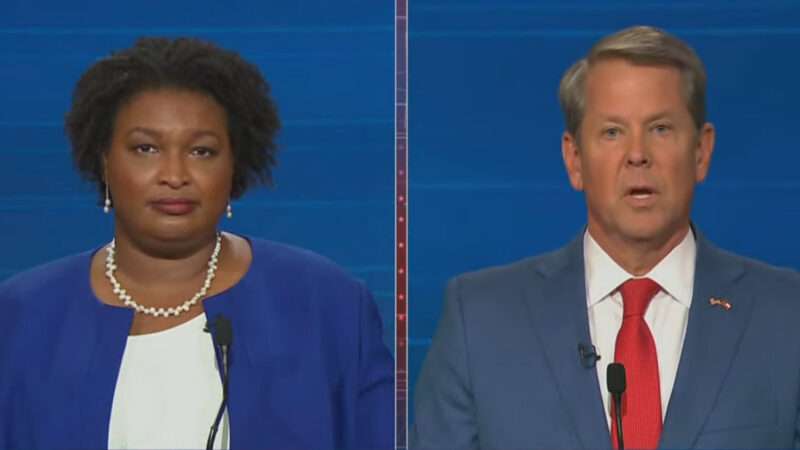
Four years ago, Stacey Abrams, former Democratic minority leader of the Georgia House of Representatives and part-time romance novelist, ran for governor of her state. While she narrowly lost to the Republican, Georgia Secretary of State Brian Kemp, Abrams' run captured national attention.
Two years ago, Abrams' tireless voter registration efforts were credited with Joe Biden's victory in the state, the first Democrat to win Georgia's electoral votes in nearly three decades.
This year, Abrams sought a rematch. While Kemp, now the incumbent, faced multiple primary opponents, Abrams ran unopposed for the Democratic nomination. But despite a cleared field and political stardom, Abrams faces a significant polling disadvantage, averaging a five-point deficit in recent weeks. At Monday night's debate with Kemp and Libertarian candidate Shane Hazel, Abrams needed to break away from the pack.
Unfortunately, no matter whether the Republican or Democrat wins in November, the agenda going forward will be the same: more government interference in the lives of Georgians.
In response to a pointed rebuke from Hazel about marijuana arrests, Kemp retorted that he was "going after street gangs and drug cartels," not "recreational users." Later in the hour, he defended his strict drug policy by blaming "the amount of fentanyl that's coming across the Southern border because of bad border policy from [the Biden] administration." Kemp apparently did not consider that demand for fentanyl could be fueled by marijuana crackdowns.
Kemp also criticized Abrams for her support of "ending cash bail." Indeed, just hours before hitting the debate stage, Kemp unveiled a new policy agenda geared toward cracking down on gangs and encouraging cash bail, despite there being little evidence that the absence of cash bail increases crime.
Kemp proposed doubling the prison penalty from five to 10 years for recruiting a minor into a gang. But the only way to enforce such a provision is for the government to have the singular authority to determine what is or is not a street gang. In 2020, police in Phoenix tried to designate protesters holding "ACAB" ("all cops are bastards") placards as a street gang; months later, the department admitted the categorization was bogus, but not before more than a dozen protesters were arrested and spent months fighting charges. Earlier this year, the First U.S. Circuit Court of Appeals suggested that gang databases pose grave constitutional concerns.
Meanwhile, Abrams dinged Kemp for "the rise of Chinese Communist Party-backed companies purchasing American farmland." Over the weekend, Abrams told Fox News that Kemp "is placing farmland in the state of Georgia in the hands of, basically, a nation that has proven itself to be a national security threat." She cited a state-funded website in which Kemp encourages Chinese investment in Georgia. But Kemp is not seizing property for resale, he's encouraging Chinese companies to purchase land that Georgians are willing to sell.
Currently, Georgia's schools sit in the bottom half of national rankings. Neither Kemp nor Abrams questioned whether the government is best equipped to educate schoolchildren, just how much money should be spent on it. Kemp bragged that in his first term, he had achieved a $5,000 pay increase for teachers; Abrams countered that $5,000 was insufficient, and that she would boost teacher pay by an additional $11,000. Abrams said that she would accomplish this by tapping into Georgia's $6.6 billion tax surplus; notably, neither candidate suggested giving those funds back to the Georgians who paid them.
Whether Abrams' debate performance will lead to a bump in the polls remains to be seen. It's entirely possible that Abrams' initial star-making run coincided with the 2018 "blue wave," and she is simply reverting to the mean. But whether she manages an upset or Kemp is returned to the Governor's Mansion, Georgians can expect to face more interference from their state government.
The post Brian Kemp and Stacey Abrams Both Advocate More Government in Georgia Governor Debate appeared first on Reason.com.







